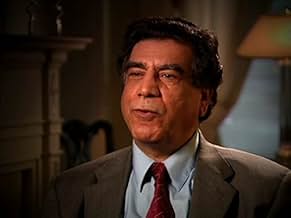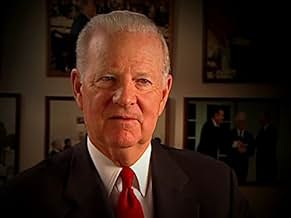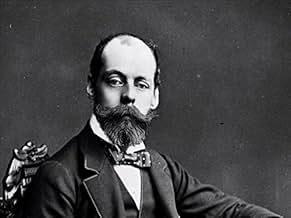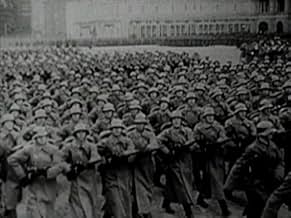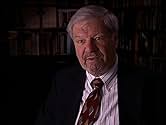Aggiungi una trama nella tua linguaBased on information derived from formerly classified documents and messages, coupled with interviews with experts, authors and eyewitnesses from all over the world, SECRET OF WAR is the mos... Leggi tuttoBased on information derived from formerly classified documents and messages, coupled with interviews with experts, authors and eyewitnesses from all over the world, SECRET OF WAR is the most comprehensive documentary series ever produced on "secrets of war" throughout the last c... Leggi tuttoBased on information derived from formerly classified documents and messages, coupled with interviews with experts, authors and eyewitnesses from all over the world, SECRET OF WAR is the most comprehensive documentary series ever produced on "secrets of war" throughout the last century. Narrated by Charlton Heston, this acclaimed series features declassified and rare ... Leggi tutto
- Premi
- 2 vittorie totali
Recensioni in evidenza
Unfortunately, the notion promoted by the US military to this day that in Vietnam the Americans scored all those "battlefield victories" goes unchallenged here. In truth the whole idea of what a victory is, even what constitutes a "battle", had to be re-thought in that conflict.
There also are some outright distortions, such as the reason behind Operation Linebackers I and II--the notorious "Christmas Bombing" of Hanoi. It was not Hanoi's intransigence that caused the Paris peace talks to stall. The problem was the administration in Saigon--our own side, that is--that showed a sudden and very ill- timed independence and balked at signing the accords, knowing it had no popular support in the South.
However, that said, it's a knowledge of history that can provide from-an-unexpected-perspective both hope and tranquility. Because, a study of history makes clear that none of the "evils" nor issues we face in the present are anything essentially new to humanity, and that, despite history showing that humanity isn't getting qualitatively better, history also shows that humanity is not at all getting qualitatively worse. People and situations have always been "this bad", yet, humanity is still here plodding along.
This series makes clear that people and situations today are no worse than people and situations were fifty and seventy-five years ago. For example, as this series evidences, US politicians, presidents, and military and government leaders served their personal agendas and smiled while blatantly lying to the US citizenry and the world then no less than they do today. US government used whatever technology was available then to spy on its own citizens and on other nations, and did so under the justification, "defending US interests". US corporations interfered in the governments of other nations when they felt their profits threatened. Words and phrases were deliberately crafted and manipulated by government and businesses in order to discredit competitors and malign those who disagreed with policy. The US public lived in fear then too, no less and perhaps moreso than the fear felt today. And yet, after all that and more, neither the US nor the world "ended". Despite it all, humanity manages to keep its head above water and continue on.
This series affirms that "nothing is new under the sun." Its scrutiny of history demonstrates that it's possible for humans to create some shade for ourselves at times. But, more importantly, this series impresses that the glare isn't any worse than ever, and so gives reason not to despair despite that glare being relentless. In spite of ourselves, humanity survives and presses onward.
It's well done too. Charlton Heston's cadenced baritone take us through the 30s into the Cold War. Heston's speech is distinctive. It is, after all, the voice of Ben Hur, Michelangelo, and Moses. But it's an actor's voice, and Heston lends some nice inflections to the usual drone. He sounds at time as if he's improvising an interesting tale, not reading from a script. Heston himself served in the Army Air Force during the war and was stationed in Alaska during preparations for the invasion of Japan that, fortunately, I suppose, didn't happen.
I'm not a historian and I've only watched a few of the episodes but I expect the series will hold up as well as it has. I much admire the objectivity of the series. The narration (and the other elements) don't sound like a giddy announcer at a high school football game. Triumphs and disasters are presented even handedly. Fictions are exposed for what they are.
Eg., the Americans didn't capture that damned Enigma machine or whatever it was from a disabled U-boat; the British did, despite Hollywood. The CIA went nuts trying to kill Castro, poisoning his cigars and whatnot, and enlisting the Mafia in the attempt. They cooperated, of course, because, along with the United Fruit Company, they OWNED Cuba. The best intelligence system in WWII was under Stalin. If his agents slacked off, he had them killed.
The entire period of the war and the Cold War that followed, even Vietnam, seems to be fading from our shared cultural data base. I agree completely with the earlier reviewer's lament. I'm not sure it's exclusively our educational system that's at fault. There seems to me to be a decreasing interest in anything that does not impact the body or its welfare. Are we getting less curious because we think we know everything that needs to be known?
From the Chicago Tribune: "Recently Ron Grossman took a survey in the newsroom, asking colleagues to identify the iconic World War II photo of the raising of the American flag on Iwo Jima. While some recognized the image, others couldn't quite place it. "I know I ought to know it. It was in the movie, Flags of Our Fathers," one co-worker said. Some, seeing military uniforms, figured out it must be a war photo. Maybe Vietnam? One suggested it was D-Day. Journalists are probably more attuned to history than many people who have less motivation to keep up with the past (almost 25% of 17-year-olds couldn't identify Adolf Hitler in a survey)." More? One third of us can't identify a photo of Vice President Joe Biden. One out of five of us don't know which country we achieved our independence from.
How about if we show the entire series in every high school senior class as a prelude to graduation? We can staple their eyelids open.
I liked the calm interviews, the old photos used, the old videos used for each relevant interview, the calm setting, the very deep history research. Some have complained about the show being biased in a left-wing direction, but at least in this episode the bias was not significant. It's largely about USSR vs. Britain and USA and most progressives don't love USSR that much so there is not much room for bias in this one story. I guess it shows how one needs to pick the right story and setting to study. It's very great stuff and very much an ideal intro to this spy ring. No matter the bias in other episodes the quality of narration, the history lessons, and the old material hold up to a way above average level which by itself is enjoyable. I would recommend watching this and then also watching something with a neutral/right-wing bias at the same time to get the full picture. For me this episode was pretty much an ideal retelling of the story and very impressive.
Check it out.
Lo sapevi?
- QuizThe 65 hour series Sworn to Secrecy: Secrets of War is the largest single body of work in Charlton Heston's esteemed career.
I più visti
- How many seasons does Secrets of War have?Powered by Alexa
Dettagli
- Data di uscita
- Paese di origine
- Siti ufficiali
- Lingua
- Celebre anche come
- History Exposed
- Luoghi delle riprese
- Aziende produttrici
- Vedi altri crediti dell’azienda su IMDbPro
- Tempo di esecuzione53 minuti
- Colore
- Mix di suoni
- Proporzioni
- 1.33 : 1
Contribuisci a questa pagina






